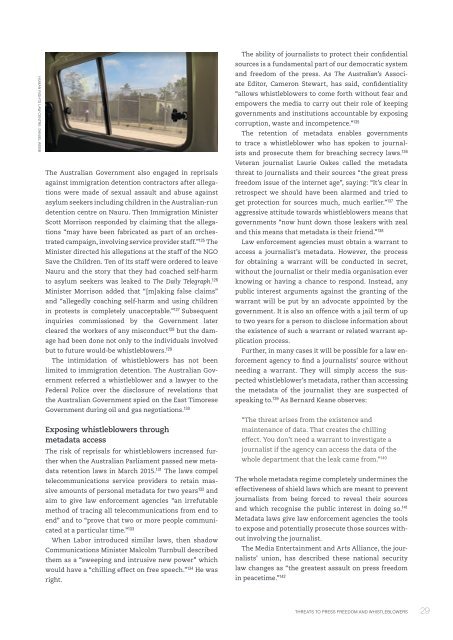Safeguarding Democracy
HRLC_Report_SafeguardingDemocracy_online
HRLC_Report_SafeguardingDemocracy_online
Create successful ePaper yourself
Turn your PDF publications into a flip-book with our unique Google optimized e-Paper software.
HUMAN RIGHTS LAW CENTRE: DANIEL WEBB<br />
The Australian Government also engaged in reprisals<br />
against immigration detention contractors after allegations<br />
were made of sexual assault and abuse against<br />
asylum seekers including children in the Australian-run<br />
detention centre on Nauru. Then Immigration Minister<br />
Scott Morrison responded by claiming that the allegations<br />
“may have been fabricated as part of an orchestrated<br />
campaign, involving service provider staff.” 125 The<br />
Minister directed his allegations at the staff of the NGO<br />
Save the Children. Ten of its staff were ordered to leave<br />
Nauru and the story that they had coached self-harm<br />
to asylum seekers was leaked to The Daily Telegraph. 126<br />
Minister Morrison added that “[m]aking false claims”<br />
and “allegedly coaching self-harm and using children<br />
in protests is completely unacceptable.” 127 Subsequent<br />
inquiries commissioned by the Government later<br />
cleared the workers of any misconduct 128 but the damage<br />
had been done not only to the individuals involved<br />
but to future would-be whistleblowers. 129<br />
The intimidation of whistleblowers has not been<br />
limited to immigration detention. The Australian Government<br />
referred a whistleblower and a lawyer to the<br />
Federal Police over the disclosure of revelations that<br />
the Australian Government spied on the East Timorese<br />
Government during oil and gas negotiations. 130<br />
Exposing whistleblowers through<br />
metadata access<br />
The risk of reprisals for whistleblowers increased further<br />
when the Australian Parliament passed new metadata<br />
retention laws in March 2015. 131 The laws compel<br />
telecommunications service providers to retain massive<br />
amounts of personal metadata for two years 132 and<br />
aim to give law enforcement agencies “an irrefutable<br />
method of tracing all telecommunications from end to<br />
end” and to “prove that two or more people communicated<br />
at a particular time.” 133<br />
When Labor introduced similar laws, then shadow<br />
Communications Minister Malcolm Turnbull described<br />
them as a “sweeping and intrusive new power” which<br />
would have a “chilling effect on free speech.” 134 He was<br />
right.<br />
The ability of journalists to protect their confidential<br />
sources is a fundamental part of our democratic system<br />
and freedom of the press. As The Australian’s Associate<br />
Editor, Cameron Stewart, has said, confidentiality<br />
“allows whistleblowers to come forth without fear and<br />
empowers the media to carry out their role of keeping<br />
governments and institutions accountable by exposing<br />
corruption, waste and incompetence.” 135<br />
The retention of metadata enables governments<br />
to trace a whistleblower who has spoken to journalists<br />
and prosecute them for breaching secrecy laws. 136<br />
Veteran journalist Laurie Oakes called the metadata<br />
threat to journalists and their sources “the great press<br />
freedom issue of the internet age”, saying: “It’s clear in<br />
retrospect we should have been alarmed and tried to<br />
get protection for sources much, much earlier.” 137 The<br />
aggressive attitude towards whistleblowers means that<br />
governments “now hunt down those leakers with zeal<br />
and this means that metadata is their friend.” 138<br />
Law enforcement agencies must obtain a warrant to<br />
access a journalist’s metadata. However, the process<br />
for obtaining a warrant will be conducted in secret,<br />
without the journalist or their media organisation ever<br />
knowing or having a chance to respond. Instead, any<br />
public interest arguments against the granting of the<br />
warrant will be put by an advocate appointed by the<br />
government. It is also an offence with a jail term of up<br />
to two years for a person to disclose information about<br />
the existence of such a warrant or related warrant application<br />
process.<br />
Further, in many cases it will be possible for a law enforcement<br />
agency to find a journalists’ source without<br />
needing a warrant. They will simply access the suspected<br />
whistleblower’s metadata, rather than accessing<br />
the metadata of the journalist they are suspected of<br />
speaking to. 139 As Bernard Keane observes:<br />
“The threat arises from the existence and<br />
maintenance of data. That creates the chilling<br />
effect. You don’t need a warrant to investigate a<br />
journalist if the agency can access the data of the<br />
whole department that the leak came from.” 140<br />
The whole metadata regime completely undermines the<br />
effectiveness of shield laws which are meant to prevent<br />
journalists from being forced to reveal their sources<br />
and which recognise the public interest in doing so. 141<br />
Metadata laws give law enforcement agencies the tools<br />
to expose and potentially prosecute those sources without<br />
involving the journalist.<br />
The Media Entertainment and Arts Alliance, the journalists’<br />
union, has described these national security<br />
law changes as “the greatest assault on press freedom<br />
in peacetime.” 142<br />
THREATS TO PRESS FREEDOM AND WHISTLEBLOWERS<br />
29


